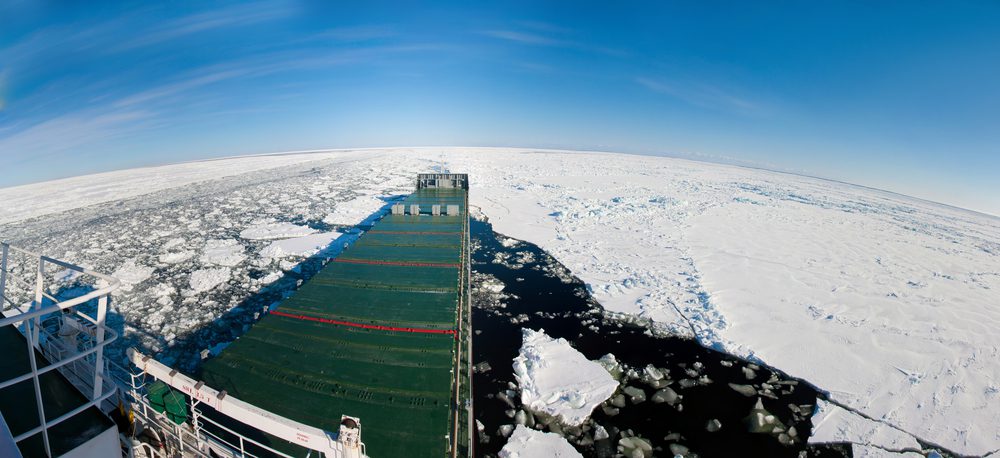NATO Launches Arctic Mission After Trump’s Greenland Threats
NATO will bolster its Arctic presence with a new mission after US President Donald Trump triggered an alliance crisis over his attempts to take Greenland.

![]() By Alister Doyle and Alistair Scrutton
By Alister Doyle and Alistair Scrutton
OSLO/STOCKHOLM, Jan 22 (Reuters) – Western sanctions on Russia are restricting the Arctic shipping route along its north coast to domestic cargoes and energy exports with many foreign firms staying away after test voyages on a fabled short-cut between Europe and Asia.
A decline in foreign shipments on the Northern Sea Route (NSR) in 2014, interrupting gains in recent years as ice retreats, dims prospects for a shipping lane that is often seen as a rare positive side-effect of global warming.
“We’re ending the era of foreign demonstration voyages that were promoted by Russia. Now it seems that reality is kicking in,” said Bjorn Gunnarsson, managing director of the Centre for High North Logistics that is funded by the Norwegian government and companies interested in the Arctic.
INFOGRAPHIC: Arctic Shipping Routes
“Many projections of foreign interest were over-optimistic,” he said. “Sanctions directly affect energy projects in the Arctic, indirectly transport.”
President Vladimir Putin, as prime minister in 2011, heralded the NSR as an artery to rival traditional trade lanes.
But last year, the number of voyages on the NSR by fell to 53 from 71 in 2013 after years of experiments by foreign firms – helped by low Russian tariffs – with vessels including bulk carriers and oil and liquefied natural gas (LNG) tankers.
The $27 billion Yamal LNG project on Russia’s north coast, due to start in 2018 and led by Russia’s Novatek, will enable LNG tankers to export gas both east to Asia and west to Europe.
Traffic in 2014 was dominated by Russian-flagged vessels – mainly cargo ships and oil and chemical tankers, according to the NSR Information Office in Murmansk.
The route, first known to have been sailed by Swedish explorer Adolf Erik Nordenskiold in 1878 after centuries of failed attempts, may remain predominantly Russian with sanctions deterring Western business with Moscow.
“Shipping going in or out of Russian ports has the biggest potential,” said Arild Moe, an NSR expert at the Fridtjof Nansen Institute in Oslo. He said five foreign vessels used the NSR without calling at a Russian port in 2014, down from 13 in 2013.
NICHE ROUTE
Low oil prices, uncertainties about ice and a lack of ports and search and rescue also discourage traffic on a route that was also used more extensively during Soviet times, when ice-breakers blasted routes through thick ice.
Last year Russian icebreakers “were getting much more money from the energy companies to work (at Yamal) than with shipping companies” on the NSR, said Ekaterina Klimenko, a researcher at the Stockholm International Peace Research Institute.
A lack both of infrastructure and commercial viability would hold back the route, at least for the next two years, she told an Arctic conference.
“Long term, I think it is an issue of building up infrastructure and it will be mainly the energy and mineral extraction that will feed into this,” said Niklas Granholm of the Swedish Defence Research Agency.
Developing other uses would have to wait, he said.
The lure is that a voyage from Rotterdam to Shanghai is 8,050 nautical miles on the NSR, for instance, and 10,500 via the Suez Canal. And the NSR is less clogged by ice than an alternative Arctic route north of Canada.
“It will always be a niche trading route compared to the Suez Canal but with the right conditions it will grow significantly,” said Patrick Mossberg, chief operating officer of private Swedish shipowner Marinvest.
Marinvest’s ships have used the route nine times since 2011 but had no voyages in 2014. Novatek, which chartered Marinvest vessels for the NSR, switched many oil loading operations to Ust-Luga in the Baltic Sea from the Murmansk region.
Mossberg said a niche market might be 200 vessels a year – Suez handled 16,596 in 2013. Among other companies, Danish-based Nordic Bulk Carriers had just one NSR voyage last year after a total of 15 in the previous two. The firm declined comment. (Writing by Alister Doyle, editing by William Hardy)
© 2015 Thomson Reuters. All rights reserved.
This article contains reporting from Reuters, published under license.

Sign up for gCaptain’s newsletter and never miss an update

Subscribe to gCaptain Daily and stay informed with the latest global maritime and offshore news
Essential news coupled with the finest maritime content sourced from across the globe.
Sign Up